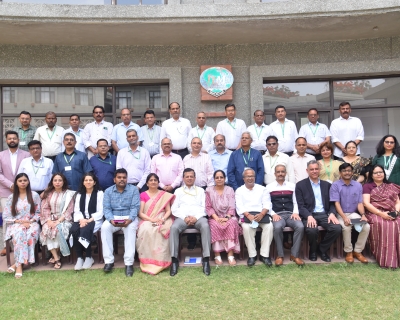Implementation Science and Health Systems Research
Latest News

Johns Hopkins Researchers Receive NIH Grant to Strengthen Surgical and Rehabilitation Research in Tanzania
Researchers at the Johns Hopkins University received a grant to help strengthen surgical and rehabilitation research in Tanzania.

New Leadership Training Program Will Enhance Health Systems Strengthening in Uttar Pradesh, India
First-of-its-kind leadership program for medical officers who manage and implement public health programs.

As Global Health Programs Transition to Local Entities, Researchers Turn an Eye toward Sustainability
Researchers are examining what factors make programmatic transition successful, equitable, and sustainable.
Implementation Science and Health Systems Research in the Health Systems Program
Our work on implementation science and health systems research supports the design, contextual adaptation, and evaluation of health systems strengthening strategies. We work to ensure that policies, programs, and practices are evidence-based and that they benefit all, particularly low-income communities. Our faculty contribute different disciplinary lenses— from economics to biostatistics and management theory— to understand whether, how, and for whom programs and policies work, and to identify and address implementation bottlenecks. Our projects collaborate closely with practitioners and decision-makers, ensuring that our research is rooted in and tailored to each unique context.
Our faculty lead efforts to improve health system performance and enhance the quality of care, focusing on areas such as human resources for health, health information management systems, injury prevention, digital health, and noncommunicable diseases, as well as health program monitoring and evaluation and health systems strengthening. Through this approach, we support building resilient and learning health systems capable of scaling up interventions sustainably and equitably.
Meet some of our implementation science and health systems research faculty

Sara Bennett, PhD, MPhil, examines health policy and systems in low- and middle-income countries with a focus on institutional capacity, sustainability, and systems governance.

Ligia Paina, PhD ’14, MHS ’08, studies how to improve health systems policies and programs so they provide equitable, quality care and are responsive to poor and marginalized communities.

Md Zabir Hasan, PhD ’19, MPH, MBBS, studies health policy and systems to strengthen health equity, global health, and health systems in low- and middle-income countries.

Shivam Gupta, PhD ’09, MPH ’04, MBBS, studies primary health care, health systems strengthening, and road safety in low- and middle-income countries.
Examples of Latest Projects
Integration of Rehabilitation-Specific Indicators in Uganda's National Health Information Management System: The ReLAB-HS team, in collaboration with WHO, is helping Uganda's Ministry of Health integrate rehabilitation-specific indicators into the District Health Information System 2. This activity aims to improve the collection, analysis, and use of data related to rehabilitation services, including monitoring facility inputs, service utilization, assistive product distribution, and health outcomes.
CDC National Public Health Institute Support: Faculty are supporting the Georgian National Center for Disease Control to strengthen the Georgian public health workforce. The work is focused on developing public health competencies, conducting competency assessment, development of public health workforce strategy, analysis of human resources for health data to support development of the public health workforce, and support in the design and development of a human resource information system.
Evaluation & updating of the WHO Global NCD Platform Online Training Course on Building and Sustaining Multistakeholder and Multisectoral Collaboration to Address NCDs & Improve Mental Health: This project is a collaboration between Department of International Health faculty and WHO to evaluate and expand an existing course on noncommunicable diseases to include service integration with maternal, newborn, and child health care and mental health. The aim of the course is to inform context-specific solutions and build national capacities in low- and middle-income countries to address NCDs through multisectoral action and service integration with mental health across the life course.
Reducing the health equity gap for marginalized communities in Chandigarh India by leveraging key digital health interventions: Faculty from the Department of International Health at the Johns Hopkins Bloomberg School of Public Health and the Johns Hopkins Whiting School of Engineering are working with the Postgraduate Institute of Medical Education and Research, Chandigarh, in collaboration with the Chandigarh Administration, Chandigarh India, to examine the feasibility and acceptability of implementing telemedicine through the eSanjeevani platform in two urban slums.
Latest Publications and Reports
Five recommendations to advance implementation science for humanitarian settings: The next frontier of humanitarian research
Conflict and Health | May 2024
Translating global evidence into local implementation through technical assistance: A realist evaluation of the Bloomberg Philanthropies Initiative for Global Road Safety
Globalization and Health | May 2024
From legacy to integration in the Global Polio Eradication Initiative: Looking back to look forward
BMJ Global Health | May 2024
Bridging the gap or widening the divide? Exploring the dual role of social capital in healthcare financing in rural Uttar Pradesh, India
Social Science & Medicine | May 2024
Appraising LaQshya's potential in measuring quality of care for mothers and newborns: A comprehensive review of India's Labor Room Quality Improvement Initiative
BMC Pregnancy and Childbirth | April 2024
